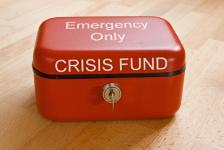Does Everyone Need an Emergency Fund?
With the devastation of Hurricane Sandy, Money Girl fans are wondering: If a natural or manmade disaster comes your way, how much savings do we really need for a rainy day?
Laura Adams, MBA

A Money Girl Facebook fan named Jim G. asks:
“I retired from the military and Postal Service and have pension income that covers my monthly expenses. Additionally, I have a low-paying job, $370,000 in investments, and $3,000 in savings. Does everyone need an emergency fund, including a retiree like me?”
Not getting the Money Girl Newsletter? Sign up for FREE money tips and advice!
ANSWER:
The primary purpose of an emergency fund is to have cash on hand to cover expenses if you lose your job or business—or have unexpected expenses (like having to recover from a hurricane!).
Without some amount of cash to tap, a financial crisis may force you to take out high-interest loans or to use expensive credit cards. Having a financial emergency is bad enough—but going into debt for one could double or triple the cost.
That’s why I recommend that everyone accumulate a minimum of 3 to 6 month’s worth of living expenses in an FDIC-insured savings account. That amount is a ballpark estimate. You could need a little less or substantially more, depending on factors such as your job stability, debt load, and family needs.

- Inflation: If the prices of goods and services go up, but your income stays flat, you’ll feel the squeeze. It’s likely that Jim’s pension payments are adjusted annually for inflation—but many corporate pension payments are not. Social Security does provide a cost of living adjustment (COLA) in some years, but those increases may not completely offset your actual expenses. Having emergency money to fall back on helps you pay critical expenses—such as food and medicine—if they escalate more than expected.
- Market volatility: If the purchasing power of Jim’s retirement income diminishes, he does have a nest egg of $370,000 to tap. However, its value could go down, depending on how it’s invested and what happens in the financial markets. Since successful investing depends on buying low and selling high, you can avoid selling at the wrong time if you have emergency money to spend instead. By postponing selling investments when the market is down, you can make them last longer.
- Unexpected expenses: We never know what financial surprises could be around the corner, like home maintenance and vehicle repairs. Additionally, getting older means more medical tests, dental work, and hearing and eye care that may not be fully covered by insurance or Medicare and require out-of-pocket payments.
Having an emergency fund gives everyone a buffer to manage financial setbacks with as little stress as possible. Retirees get the added benefits of being able to handle inflation, market volatility, and unexpected medical expenses without going into debt or selling investments at the worst possible times.
Other Articles and Resources You Might Like:
How to Make Decisions About Personal Finances
Use a 401(k) to Pay Off Credit Cards?
How to Invest in the Perfect Portfolio
Should I Pay Off My Mortgage or Invest?
Not subscribed to the free Money Girl podcast on iTunes? Click here to subscribe!
Emergency fund photo from Shutterstock.

